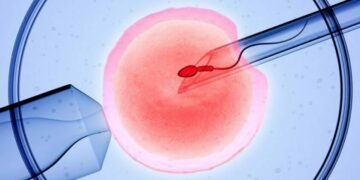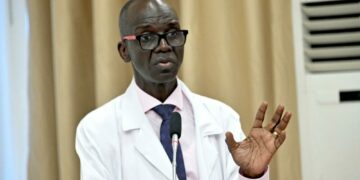Consultant Obstetrician, Gynaecologist and Chief Executive Officer of Nordica Fertility Centre, Dr. Abayomi Ajayi, has raised concern over what he described as a “galloping rise” in male infertility across Nigeria, attributing it largely to lifestyle factors and ignorance.
Speaking at the Nordica Fertility Centre Abuja’s 13th anniversary celebration, Dr. Ajayi revealed that a decade-long study conducted between 2003 and 2013 showed a 30 per cent decline in sperm count among Nigerian men, while a more recent assessment found that about 12 per cent of men currently presenting at the clinic have no sperm at all (azoospermia).
“Male infertility is a big issue in Nigeria. About 12 per cent of men we see have no sperm at all, and nearly 50 per cent have low sperm count. Lifestyle choices, substance use, and exposure to harmful environmental factors such as heavy metals from mining activities are major contributors,” he said.
Dr. Ajayi expressed concern over the lack of awareness about fertility health among young men, stressing the need for early education on reproductive wellbeing.
“Many young men take muscle-enhancing or performance-boosting drugs without realising they can destroy their fertility. Ignorance is at the root of it, and we need more health education,” he said.
He also lamented Nigerians’ low interest in preventive health, noting that “the only part of health most people are interested in is weight loss,” while issues like fertility and reproductive health receive little attention.
Ajayi disclosed that Nordica Fertility Centre, with branches in Lagos, Abuja, and Asaba, has recorded over 5,000 births since inception. He announced plans to expand the centre’s operations to include a new world-class hospital in Lagos and other states, combining healthcare with hospitality.
“Healthcare in Nigeria is still at its infancy, and I believe Nigerians themselves must drive the change. We’ve cracked the code of fertility; the next step is to scale and train others,” he added.
Also speaking at the event, a Fertility expert Dr. Jesse Atongo, explained that the success of In Vitro Fertilization (IVF) depends largely on the genetic quality of eggs and sperm, noting that age significantly affects fertility outcomes.
“The quality of a woman’s eggs begins to decline from age 35 and drops sharply after 40. That’s why we recommend egg preservation before 35,” he said.
Atongo urged women who are not ready for marriage or childbearing to consider egg freezing, adding that stored eggs remain viable for years if properly preserved. He also emphasised the role of regular sexual activity in maintaining sperm quality, warning that prolonged abstinence, stress, alcohol, and smoking can damage sperm DNA.
He explained that pre-implantation genetic testing (PGT) can improve IVF success rates to as high as 70 per cent by identifying genetically healthy embryos before implantation.





